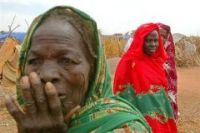Sudan must reform its legal system to halt mass rapes according to U.S. aid group report
Sudan must urgently reform its legal system if it wants to halt the mass rapes of women and girls, according to the U.S. aid group report.

Harassement and rape of women, especially ethnic African refugees caught in Darfur's violence, are a major feature of the conflict in this western Sudanese region, where over 200,000 people have died and 2.5 million fled their homes since 2003, when local rebels took up arms against the central government.
But Khartoum has protected Darfur rapists, often because they belong to government forces, and has made it extremely difficult for victims to access medical treatment or seek justice, said the U.S. aid group Refugees International in a new report.
The Sudanese government must acknowledge "the extent of the problem, including the high incidence of rape being perpetrated by members of the armed forces and affiliated militias," said the study, entitled "Laws without justice."
The aid group said the government must reform the Islamic law in vigor in Sudan to differentiate rape from "zina" an Arabic term for the crime of having sex outside marriage. It also called on authorities to accept the testimonies of victims, rather than treat them as potential suspects, and grant the same value to a female's account as to a male's.
Law and procedures "must be changed", the report said, calling on the U.S. to "implement tougher policies against the government of Sudan, including stricter sanctions, to end the violence and rape."
Reforms should include lifting the quasi-impunity of soldiers a militiamen suspected in most rape cases by letting them be tried in civilian courts, Refugees International said.
Khartoum's government denies rape is widespread in Darfur or that it is mainly committed by pro-government forces such as the janjaweed militias.
Officials argue that victims or rights groups rarely provide the evidence required under Sudanese law to open a rape investigation.
"We always seem to get sweeping generalizations, without naming the injured, without naming the offenders ... or supplying us with sufficient facts," Justice Minister Mohammed Ali al-Mardi told reporters in response to a U.N. report in April that accused uniformed men of having recently raped 15 Darfur women.
The International Criminal Court in The Hague listed mass rape as one of its main charges against a Sudanese Cabinet minister and an alleged janjaweed chief against whom arrest warrants were recently issued on 51 counts of crimes against humanity and war crimes in Darfur.
Khartoum created a task force to combat rape in 2005. Its head, women's rights activist Attayet Mustapha, told The Associated Press the government had "decided to enforce a zero tolerance policy toward rape in Darfur."
But she acknowledged that only eight offenders were sentenced by Sudanese courts for Darfur rape crimes in 2006.
The United Nations says it registered 2,500 rapes in the region for 2006, but many U.N. and aid workers say the real figures are likely in the several thousands each month.
The occurrence of rape is notoriously difficult to assess in Darfur because of the social ostracism victims face by reporting it and government harassment against aid groups trying to address the problem.
The Refugees International report pointed to two managers from the aid group Medecins Sans Frontiиres who were jailed after reporting they had treated 500 rape victims between late 2004 and early 2005 in their Darfur clinic.
The International Rescue Committee, a U.S. aid group, has also faced heavy government pressure since last August when it spoke out against a wave of attacks in the South Darfur refugee camp of Kalma where over 200 women were assaulted in about a month.
Refugees International's team researching the report was barred from traveling to Darfur and then expelled from the country in March.
Subscribe to Pravda.Ru Telegram channel, Facebook, RSS!


